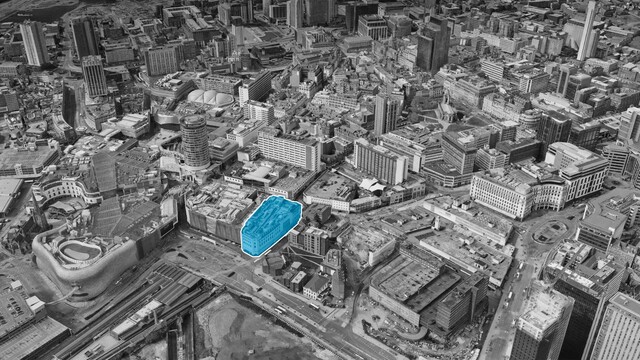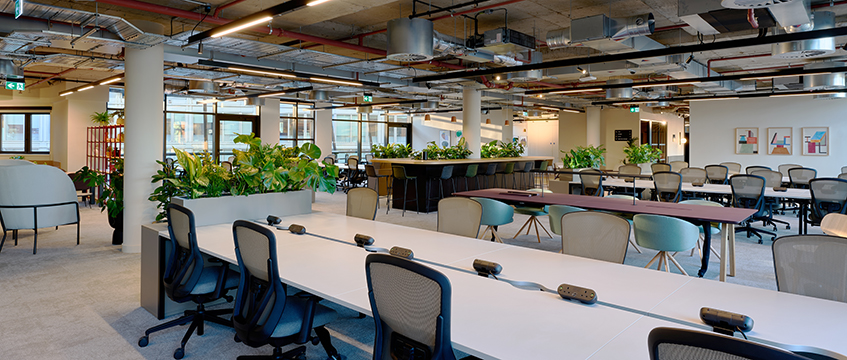Derwent brings forward net zero target
Derwent London has brought forward its target for running a net-zero-carbon property portfolio by two decades to 2030, as its chief executive describes climate change as “an enormous challenge” to which the real estate industry “must respond”.
The company has committed to its three schemes currently under construction being net-zero-carbon buildings. These include 80 Charlotte Street, W1, which will be Derwent’s first all-electric building.
The remaining buildings in the portfolio will be operated on a net-zero basis by 2030. Derwent said it will achieve this through working with occupiers to reduce energy consumption and using renewable energy, as well as retrofitting some of its older buildings.
Derwent London has brought forward its target for running a net-zero-carbon property portfolio by two decades to 2030, as its chief executive describes climate change as “an enormous challenge” to which the real estate industry “must respond”.
The company has committed to its three schemes currently under construction being net-zero-carbon buildings. These include 80 Charlotte Street, W1, which will be Derwent’s first all-electric building.
The remaining buildings in the portfolio will be operated on a net-zero basis by 2030. Derwent said it will achieve this through working with occupiers to reduce energy consumption and using renewable energy, as well as retrofitting some of its older buildings.
The company will also ensure that all future schemes undergo carbon appraisals as well as financial appraisals.
The move brings Derwent’s activities into alignment with the United Nations’ goal of keeping global warming to no more than 1.5°C.
“Climate change presents an enormous challenge to us all, and our industry must respond,” said Derwent chief executive Paul Williams, announcing the new strategy. “Derwent London has long recognised this; with regeneration at our heart, we have embedded sustainability into the organisation and are focused on turning ‘brown’ buildings ‘green’. Today we are taking our ambition to the next level.”
Costs in the near term
Analysts at research firm Green Street Advisors recently published a report in which they found that, although sustainable buildings can be leased more quickly than older, less environmentally friendly buildings, there is little evidence of a sale or rental premium. Derwent believes that will change, although the company said there will be costs in the near term.
“We believe that more energy-efficient buildings will command higher rents and values in due course, but these improvements are likely to come at a financial cost: a mixture of additional operational costs and capital expenditure as well as management time,” said Williams.
“Furthermore, acquiring less carbon-efficient buildings is always likely to be part of the group’s strategy. It is these ‘brown’ buildings that provide the raw material that we can regenerate into the ‘green’ buildings of the future. Our strategy will evolve along with the science, planning policies and regulations.”
Green efforts in Derwent’s existing buildings include the use of biomass boilers in its Angel Building, EC1, and the use of recycled elements to reduce the embodied carbon of its nearby White Collar Factory.
Derwent first set science-based targets for having a net-zero-carbon portfolio in 2017. Last October the company signed up to the climate change commitment organised by the Better Buildings Partnership. Derwent has also factored sustainability into its finances, arranging for a £450m credit facility it signed last year to include a green tranche.
More confident outlook
Derwent announced the new net-zero target alongside its annual results for 2019. The company posted a return of 6.6%, up from 5.3% a year earlier, with EPRA NAV rising by almost 5% to 3,958p per share and underlying earnings per share up by 4%. Total property returns stood at 7.4%, ahead of a benchmark index of 4.1%. The company’s portfolio has risen in value by 3.9% to £5.5bn.
The company said there is a “more confident outlook” for the London office market following December’s General Election, and confirmed that it will now bring forward further projects, beginning with 19-35 Baker Street, W1, which it holds in a joint venture with the Portman Estate set to unwind when the scheme commences.
The Baker Street site will add another 293,000 sq ft to Derwent’s development portfolio in 2021, and the company said a further 300,000 sq ft of developments could start that year.
“Alongside our major preletting successes, we have progressed our most active development programme to date and completed property disposals above book value,” said chairman John Burns. “We refinanced our convertible bonds and our main corporate revolving credit facility, extending the longevity of our debt and introducing an innovative green tranche.”
To send feedback, e-mail tim.burke@egi.co.uk or tweet @_tim_burke or @estatesgazette











